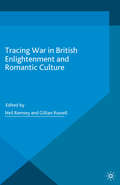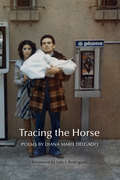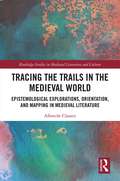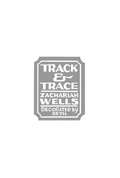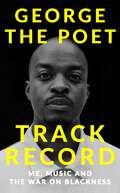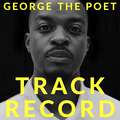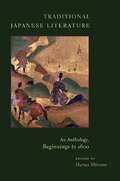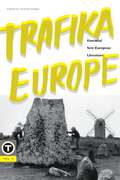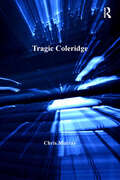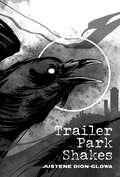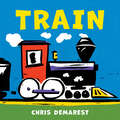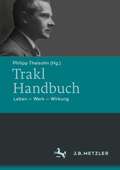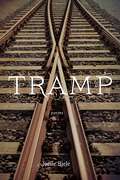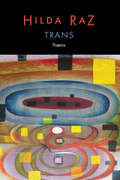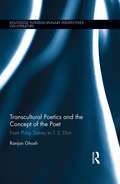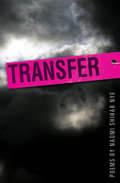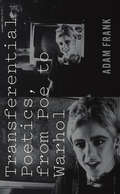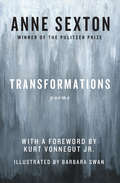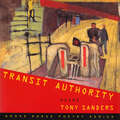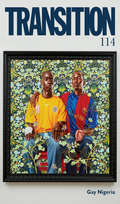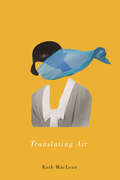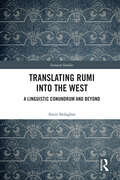- Table View
- List View
Tracing War in British Enlightenment and Romantic Culture (Palgrave Studies in the Enlightenment, Romanticism and Cultures of Print)
by Gillian Russell Neil RamseyThis volume argues for the enduring and pervasive significance of war in the formation of British Enlightenment and Romantic culture. Showing how war throws into question conventional disciplinary parameters and periodization, essays in the collection consider how war shapes culture through its multiple, divergent, and productive traces.
Tracing the Horse: A Suburban Bestiary (New Poets of America #43)
by Diana Marie DelgadoSet in Southern California's San Gabriel Valley, Diana Marie Delgado’s debut poetry collection follows the coming-of-age of a young Mexican-American woman trying to make sense of who she is amidst a family and community weighted by violence and addiction. With bracing vulnerability, the collection chronicles the effects of her father’s drug use and her brother’s incarceration, asking the reader to consider reclamation and the power of the self.
Tracing the Trails in the Medieval World: Epistemological Explorations, Orientation, and Mapping in Medieval Literature
by Albrecht ClassenEvery human being knows that we are walking through life following trails, whether we are aware of them or not. Medieval poets, from the anonymous composer of Beowulf to Marie de France, Hartmann von Aue, Gottfried von Strassburg, and Guillaume de Lorris to Petrarch and Heinrich Kaufringer, predicated their works on the notion of the trail and elaborated on its epistemological function. We can grasp here an essential concept that determines much of medieval and early modern European literature and philosophy, addressing the direction which all protagonists pursue, as powerfully illustrated also by the anonymous poets of Herzog Ernst and Sir Gawain and the Green Knight. Dante’s Divina Commedia, in fact, proves to be one of the most explicit poetic manifestations of the fundamental idea of the trail, but we find strong parallels also in powerful contemporary works such as Guillaume de Deguileville’s Pèlerinage de la vie humaine and in many mystical tracts.
Track & Trace
by Seth Zachariah WellsThe poems in Zachariah Wells's second collection range from childhood to dimly foreseen events in the future; they idle on all three of Canada's coasts, travel the open road, take walks in the city and pause on the banks of country streams and ponds.
Track Record: THE REVOLUTIONARY MEMOIR FROM THE UK'S MOST CREATIVE VOICE
by George the PoetThe ground-breaking memoir by acclaimed rapper and podcast host, George the PoetBorn to Ugandan parents on the St Raphael's Estate in Neasden, north-west London, George has always been an ambitious storyteller. Influenced by his hometown, George started MCing , and eventually found his voice in poetry and with it an avenue for change.Track Record: Me, Music, and the War on Blackness sheds light on George's upbringing and artistic career. He looks back at his education, his time at university, and his beginnings as a musician. We are given an insight into the forces that have shaped him and the stories he chooses to tell. As with George's other work, Track Record goes beyond the traditional memoir and takes the reader on a journey throughout history. George dives deep into the complexities of the economy and interrogates the legacy of colonialism. He reflects on music and its power as a political force - how it can be a catalyst for social power and economic change. By weaving a story that is both personal and political, George delivers an incredibly powerful and unique perspective on the world around us. Honest, thought-provoking and lyrical, Track Record is a fascinating insight by an inimitable storyteller.
Track Record: THE REVOLUTIONARY MEMOIR FROM THE UK'S MOST CREATIVE VOICE
by George the Poet**The ground-breaking memoir by acclaimed rapper and podcast host, George the Poet**__________'When Grime became the soundtrack to our lives, it gave a voice to the hustle. We were all looking for money, but it was deeper than that; we were looking for a future.'George the Poet knows better than anybody the importance of understanding your surroundings. Born to Ugandan parents on the St Raphael's Estate in Neasden, north-west London, George Mpanga has always been aware of his community. It was both his teacher and his inspiration - giving him the language, the experiences, and the skills to become the person he is today.In Track Record, George unveils the power dynamics that shape our world, shedding light on the forces that restrict Black creativity and put limits on Black excellence. By interrogating the history of colonialism and exploring capitalism's racist legacy, George offers a fresh perspective on the world around us.Delving into the music scene and iconic films from his childhood, as well as crucial political and economic moments in history, this book provides the backstory of where we are today.Honest, thought-provoking, and passionate, Track Record is a ground-breaking memoir by one of the UK's most unique voices.__________(P)2023 Hodder & Stoughton Limited
Traditional Japanese Literature: An Anthology, Beginnings to 1600 (Translations from the Asian Classics)
by Haruo ShiraneTraditional Japanese Literature features a rich array of works dating from the very beginnings of the Japanese written language through the evolution of Japan's noted aristocratic court and warrior cultures. It contains stunning new translations of such canonical texts as The Tales of the Heike as well as works and genres previously ignored by scholars and unknown to general readers. <P><P> This volume includes generous selections from Man'yÿsh, The Tale of Genji, The Pillow Book, Kokinsh, and other classics of Japanese literature, as well as a stunning range of folk literature, epic tales of war, poetry, and no drama. The anthology offers an impressive representation of dramatic, poetic, and fictional works from both high and low culture, along with religious and secular anecdotes, literary criticism, and works written in Chinese by Japanese writers. The wealth of classical poetry, linked verse, and popular poetry is accompanied by extensive commentary. <P><P> Traditional Japanese Literature is a companion volume to Columbia University Press's Early Modern Japanese Literature: An Anthology, 1600-1900 and part of its four-volume history of Japanese literature. Arranged by chronology and genre, the readings are insightfully introduced and placed into their political, cultural, and literary context, and the extensive bibliographies offer further study for scholars and readers. Including a wide range of classic and popular works in poetry, prose, and drama, this anthology presents a definitive overview of traditional Japanese literature and deepens our understanding of classical and medieval Japanese culture.
Trafika Europe: Essential New European Literature, Vol. 1
by Andrew SingerIn volume 1 of Trafika Europe, Andrew Singer gathers choice offerings from the first year of the quarterly journal of the same name. These fourteen selections—from seven women and seven men, seven poets and seven fiction writers—represent languages across the Continent, from Shetland Scots and Occitan, Latvian and Polish, Armenian, Italian, Hungarian, German, and Slovenian to Faroese and Icelandic. With some of the most accomplished writing in new translation from Europe today, this volume opens a window onto some emerging contours of European identity. Former ASCAP director of photography Mark Chester complements the writing with sumptuous black-and-white photos.The contributors are Vincenzo Bagnoli, Ewa Chrusciel, Christine DeLuca, Mandy Haggith, Stefanie Kremser, Aurélia Lassaque, Wiesław Myśliwski, Jóanes Nielsen, Edvīns Raups, László Sárközi, Marko Sosič, Jón Kalman Stefánsson, Nara Vardanyan, and Māra Zālīte.
Trafika Europe: Essential New European Literature, Vol. 1
by Andrew SingerIn volume 1 of Trafika Europe, Andrew Singer gathers choice offerings from the first year of the quarterly journal of the same name. These fourteen selections—from seven women and seven men, seven poets and seven fiction writers—represent languages across the Continent, from Shetland Scots and Occitan, Latvian and Polish, Armenian, Italian, Hungarian, German, and Slovenian to Faroese and Icelandic. With some of the most accomplished writing in new translation from Europe today, this volume opens a window onto some emerging contours of European identity. Former ASCAP director of photography Mark Chester complements the writing with sumptuous black-and-white photos.The contributors are Vincenzo Bagnoli, Ewa Chrusciel, Christine DeLuca, Mandy Haggith, Stefanie Kremser, Aurélia Lassaque, Wiesław Myśliwski, Jóanes Nielsen, Edvīns Raups, László Sárközi, Marko Sosič, Jón Kalman Stefánsson, Nara Vardanyan, and Māra Zālīte.
Tragic Coleridge
by Chris MurrayTo Samuel Taylor Coleridge, tragedy was not solely a literary mode, but a philosophy to interpret the history that unfolded around him. Tragic Coleridge explores the tragic vision of existence that Coleridge derived from Classical drama, Shakespeare, Milton and contemporary German thought. Coleridge viewed the hardships of the Romantic period, like the catastrophes of Greek tragedy, as stages in a process of humanity’s overall purification. Offering new readings of canonical poems, as well as neglected plays and critical works, Chris Murray elaborates Coleridge’s tragic vision in relation to a range of thinkers, from Plato and Aristotle to George Steiner and Raymond Williams. He draws comparisons with the works of Blake, the Shelleys, and Keats to explore the factors that shaped Coleridge’s conception of tragedy, including the origins of sacrifice, developments in Classical scholarship, theories of inspiration and the author’s quest for civic status. With cycles of catastrophe and catharsis everywhere in his works, Coleridge depicted the world as a site of tragic purgation, and wrote himself into it as an embattled sage qualified to mediate the vicissitudes of his age.
Trailer Park Shakes
by Justene Dion-GlowaThe poems in Trailer Park Shakes are direct and vernacular, rooted in community—a working-class Métis voice rarely heard from. These poems, while dreamlike and playful, bear unflinching witness to the workings of injustice—how violence is channeled through institutions and refracted intimately between people, becoming intertwined with the full range of human experience, including care and love. Trailer Park Shakes is a book that seems to want to hold everything—an entire cross-section of lived experience—written by a poet whose courage, attention, and capacity to trace contradiction inspire trust in her words' embrace. Dion-Glowa's poems are quietly philosophical, with a heartfelt, self-possessed politic. "Dion-Glowa's voice crackles with frank, startling insight." — Sachiko Murakami, author of Render "A collection that should and will rattle your cage and shine a light where it is needed." — John Brady McDonald, author of Kitotam
Train
by Chris DemarestIt&’s all aboard for baby&’s first train book! From the author of Plane, Bus, Ship, and Firefighters A to Z. Train chugs, Clickity-clack.Engine up front, Caboose in back. The amazing sights of a train ride through the countryside whiz by in this deceptively simple rhyming book. Little listeners will be mesmerized by this rhythmic, rhyming ride—perfect reading for kids on a roll! Praise for the books of Chris Demarest &“Creative texts and brightly colored images. The words, while spare, have been carefully chosen to create a level of anticipation and excitement for even the youngest of listeners.&”—School Library Journal on Train &“Demarest describes things seen and felt during a plane or ship ride, at the same time creating a pleasingly rhythmic, dreamy mood. Demarest&’s bold palette and unusually fluid lines lend a sophisticated, almost abstract air, furthering the impressionistic quality of the words . . . Very much a flight of fancy, this inventive melange of color, shapes and language may spur questions from youngsters beginning to wonder why the sky is blue, but the poetic trip launched here will let their imaginations soar.&”—Publishers Weekly on Plane and Ship
Trakl-Handbuch: Leben - Werk - Wirkung
by Philipp TheisohnDas Werk Georg Trakls (1887-1914) ist ebenso schmal wie bedeutend. Er gilt als Klassiker der Moderne und seine Gedichte gehören zum Kanon auch in Universität und Schule. Gleichwohl hat die Hermetik seiner Dichtung zu vielen offenen Forschungsfragen geführt. Das Handbuch stellt das Gesamtwerk dar und enthält viele exemplarische Gedichtanalysen. Darüber hinaus informiert es über Biographie, Werkkonstitution, Einflüsse und Rezeption (etwa auch Trakl-Vertonungen). Zentrale Diskurse und Topoi der Trakl-Forschung werden in Querschnitt-Artikeln erläutert. Zeittafel und umfangreiche Register beschließen den Band.
Tramp: Poems (Barataria Poetry)
by Joelle BieleUsing newspaper accounts and court records from the late nineteenth and early twentieth centuries, Joelle Biele’s poems tell the personal stories of women who left their homes and families to tramp the roads and rails. Driven by poverty, abuse, or a desire for a better life, these women often encountered misery and danger in their quest for freedom, as interviews and printed records attest. In Tramp, Biele weaves these real-life stories into poignant and insightful verse that gives us a window into previously unexplored lives.
Trans: Poems
by Hilda RazThis elegant and moving collection of poems grew out of Hilda Raz&’s experience with her son&’s journey to a transgender identity. Born Sarah, now Aaron, Raz&’s child has had a profound impact on her understanding of what it means to be a family, to be whole, and to know oneself. The collection moves between past and present, allowing Raz to reflect on her own childhood and on her experience with breast cancer to find ways to connect with Aaron. The journey takes us from intimacy to strangeness and back again, from denial to humor to grief and rage, but always laced with love and acceptance. &“Trans&” means across, through, over, to or on the other side, and beyond. This book documents some major transformations of body, self, society, and spirit that art requires and life allows. The poems are accessible and finely wrought. They are equally testaments to Raz&’s insistence on making an order out of chaos, of finding ways to create and understand and eventually accept new definitions of self and family. The physical and sensuous language of Raz&’s poems, and their humanity, keep them intimately bound to the world and to the senses.
Transcultural Poetics and the Concept of the Poet: From Philip Sidney to T. S. Eliot (Routledge Interdisciplinary Perspectives on Literature)
by Ranjan GhoshCritiquing the politics and dynamics of the transcultural poetics of reading literature, this book demonstrates an ambitious understanding of the concept of the poet across a wide range of traditions – Anglo-American, German, French, Arabic, Chinese, Sanskrit, Bengali, Urdu – and philosophies of creativity that are rarely studied side by side. Ghosh carves out unexplored spaces of negotiation and intersections between literature, aesthetics and philosophy. The book demonstrates an original method of ‘global comparison’ that displaces the relatively staid and historicist categories that have underpinned comparative literature approaches so far, since they rarely dare stray beyond issues of influence and schools, or new 'world literature' approaches that affirm cosmopolitanism and transnationalism as overarching themes. Going beyond comparatism and reformulating the chronological patterns of reading, this bold book introduces new methodologies of reading literature to configure the concept of the poet from Philip Sidney to T. S Eliot, reading the notion of the poet through completely new theoretical and epistemic triggers. Commonly known texts and sometimes well-circulated ideas are subjected to refreshing reading in what the author calls the ‘transcultural now’ and (in)fusionised transpoetical matrices. By moving between theories of poetry and literature that come from widely separated times, contexts, and cultures, this book shows the relevance of canonical texts to a theory of the future as marked by post-global concerns.
Transfer
by Naomi Shihab NyeNaomi Shihab Nye has spent thirty-five years traveling the world to lead writing workshops and inspire students of all ages. In her newest collection Transfer, she draws on her Palestinian American heritage, the cultural diversity of her home in Texas, and her extensive travel experiences to create a poetry collection that attests to our shared humanity. Among her awards, Naomi Shihab Nyehas been a Lannan Fellow, a Guggenheim Fellow, and a Witter Bynner Fellow. She has received a Lavan Award from the Academy of American Poets, the Isabella Gardner Poetry Award, the Paterson Poetry Prize, and four Pushcart prizes. In January 2010, she was elected to the board of chancellors of the Academy of American Poets.
Transfer (American Poets Continuum #128.00)
by Naomi Shihab Nye"In the current literary scene, one of the most heartening influences is the work of Naomi Shihab Nye. Her poems combine transcendent liveliness and sparkle along with warmth and human insight. She is a champion of the literature of encouragement and heart. Reading her work enhances life."— William Stafford Dusk where is the name no one answered to gone off to live by itself beneath the pine trees separating the houses without a friend or a bed without a father to tell it stories how hard was the path it walked on all those years belonging to none of our struggles drifting under the calendar page elusive as residue when someone said how have you been it was strangely that name that tried to answer Naomi Shihab Nye has spent thirty-five years traveling the world to lead writing workshops and inspire students of all ages. In her newest collection Transfer she draws on her Palestinian American heritage, the cultural diversity of her home in Texas, and her extensive travel experiences to create a poetry collection that attests to our shared humanity. Among her awards, Naomi Shihab Nye has been a Lannan Fellow, a Guggenheim Fellow, and a Witter Bynner Fellow. She has received a Lavan Award from the Academy of American Poets, the Isabella Gardner Poetry Award, the Paterson Poetry Prize, and four Pushcart prizes. In January 2010, she was elected to the board of chancellors of the Academy of American Poets.
Transferential Poetics, from Poe to Warhol
by Adam FrankTransferential Poetics presents a method for bringing theories of affect to the study of poetics. Informed by the thinking of Silvan Tomkins, Melanie Klein, and Wilfred Bion, it offers new interpretations of the poetics of four major American artists: Edgar Allan Poe, Henry James, Gertrude Stein, and Andy Warhol. The author emphasizes the close, reflexive attention each of these artists pays to the transfer of feeling between text and reader, or composition and audience— their transferential poetics. The book’s historical route from Poe to Warhol culminates in television, a technology and cultural form that makes affect distinctly available to perception. The peculiar theatricality of these four artists, Frank argues, can best be understood as a reciprocal framing relation between the bodily means of communicating affect (by face and voice) and technologies of graphic reproduction.
Transformations: Poems
by Anne SextonPulitzer Prize–winning poet Anne Sexton morphs classic fairy tales into dark critiques of the cultural myths underpinning modern society Anne Sexton breathes new life into sixteen age-old Brothers Grimm fairy tales, reimagining them as poems infused with contemporary references, feminist ideals, and morbid humor. Grounded by nods to the ordinary—a witch&’s blood &“began to boil up/like Coca-Cola&” and Snow White&’s bodice is &“as tight as an Ace bandage&”—Sexton brings the stories out of the realm of the fantastical and into the everyday world. Stripping away their magical sheen, she exposes the flawed notions of family, gender, and morality within the stories that continue to pervade our collective psyche. Sexton is especially critical of what follows these tales&’ happily-ever-after endings, noting that Cinderella never has to face the mundane struggles of marriage and growing old, such as &“diapers and dust,&” &“telling the same story twice,&” or &“getting a middle-aged spread,&” and that after being awakened Sleeping Beauty would likely be plagued by insomnia, taking &“knock-out drops&” behind the prince&’s back. Deconstructed into vivid, visceral, and often highly amusing poems, these fairy tales reflect themes that have long fascinated Sexton—the claustrophobic anxiety of domestic life, the limited role of women in society, and a psychological strife more dangerous than any wicked witch or poisoned apple.
Transit Authority: Poems (Grove Press Poetry Series)
by Tony SandersThe prize-winning poet and author of Partial Eclipse continues his investigation of urban metaphysical pathos in this collection.Transit Authority is made up of three sequences that mark the early and late junctures of the twentieth century: the first, a series of poems that investigate the early part of the century; the second, meditations based on the 1930s photographs by Berenice Abbott; and the third, “Reckoning,” in which, with spare lyricism, Sanders meditates on where this century has brought us.Sanders looks with rueful intrigue at a landscape inundated with near misses and has-beens. While it is tempting to turn away from the common predicament, his poems quietly urge us to keep looking. As the poet concludes, though “things aren’t what they should be according to the map . . . we have to press on in search of our bearings.”
Translating Air: Sessions With Freud (Hugh MacLennan Poetry Series #45)
by Kath MacLeanThe hunt over; the kill complete / limping towards perfection, padding / about the room, thorns in her thumbs / Hermes crawling on all fours – / That was the last I saw of Hilda. What is it to remember a life, to relive it, to mythologize it? Things that were said or not said haunt us for a lifetime. In Translating Air Kath MacLean imagines conversations between the modernist poet H.D. and Sigmund Freud during the poet's sessions with him in 1933 to 1934 and the dialogues that continued long afterwards in H.D.'s own mind. Shadowed by uncertainty and memory lapses or blinded by flashes of profound truth, readers are transported to a world of myth, continuity, and human connection. H.D.'s palimpsest account of herself as girl and woman, writer and Imagist, and psychic and spiritualist is engaging and elastic as it pulls readers into a space where time is both endless and sure. Questioning her sanity and a world gone mad with war, H.D.'s personal accounts help us understand what it means to love deeply, to feel passionately, and to think beyond the limits of our individual consciousness. MacLean demystifies and humanizes one of the most misunderstood modernist writers in this stunning collection. Translating Air takes us on a remarkable journey into the known and unknown and allows readers to experience one remarkable woman's struggle to get it right, to live life with dignity, hope, wisdom, and the courage to have no regrets.
Translating Rumi into the West: A Linguistic Conundrum and Beyond (Iranian Studies)
by Amir SedaghatFocusing on Rumi, the best-selling Persian mystical poet of the 13th century, this book investigates the reception of his work and thought in North America and Europe – and the phenomenon of ‘Rumimania’ – to elucidate the complexities of intercultural communication between the West and the Iranian and Islamic worlds. Presenting tens of examples from the original and translated texts, the book is a critical analysis of various dimensions of this reception, outlining the difficulties of translating the text but also exploring how translators of various times and languages have performed, and explaining why the quality of reception varies. Topics analysed include the linguistic and pragmatic issues of translation, comparative stylistics and poetics, and non-textual factors like the translator’s beliefs and the political and ideological aspects of translation. Using a broad theoretical framework, the author highlights the difficulties of intercultural communication from linguistic, semiotic, stylistic, poetic, ethical, and sociocultural perspectives. Ultimately, the author shares his reflections on the semiotic specificities of Rumi’s mystical discourse and the ethics of translation generally. The book will be valuable to scholars and students of Islamic philosophy, Iranian studies, and translation studies, but will appeal to anyone interested in the cultural dichotomies of the West and Islam.
